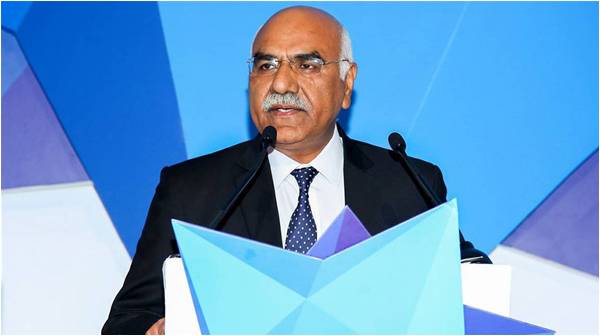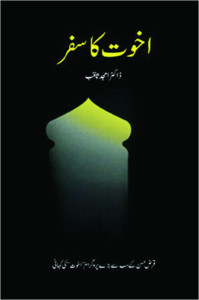
 During a trip to Pakistan in 2009, my wife had asked me to donate some money to a charity. I asked round in Lahore before calling a number where the receiver offered to come and collect the money. I was hanging out with friends at Nadia when a bespectacled middle-aged man in whites turned up, introduced himself gently and took a seat. He occasionally took part in some of the conversations before everyone departed. I gave him the money; he thanked me graciously and left. The same was to be repeated in 2010, but this time we decided to ride together as both of us were getting late for a former Presidents’ funeral. On the way, he briefed me about his work. I listened to him with a mixture of interest and suspicion, as the whole thing seemed too good to be true.
During a trip to Pakistan in 2009, my wife had asked me to donate some money to a charity. I asked round in Lahore before calling a number where the receiver offered to come and collect the money. I was hanging out with friends at Nadia when a bespectacled middle-aged man in whites turned up, introduced himself gently and took a seat. He occasionally took part in some of the conversations before everyone departed. I gave him the money; he thanked me graciously and left. The same was to be repeated in 2010, but this time we decided to ride together as both of us were getting late for a former Presidents’ funeral. On the way, he briefed me about his work. I listened to him with a mixture of interest and suspicion, as the whole thing seemed too good to be true.Following my return to London, I thought I should find out more about ‘Akhuwat’ (Solidarity) and this man behind it, Dr Amjad Saqib. For me, there was nothing new about the concept of charity, and ‘solidarity’ could readily be found in Catholic teachings as well as Social Sciences. We also know from ancient Philosophy that when wealth is centralised, the people get dispersed; when wealth is distributed, the people are brought together. Giving away money is not that difficult either but to decide to whom, when, how, and for what purpose remains a challenge. The ideal in charity is to pull the recipients into a state where they no longer need ‘Gift-love’ - our reward should be the moment when they do not need us. As I read more about the organisation, I started wondering how this man without means had spent his life searching for the magic door, which could lead him to a kingdom of heaven.
Akhuwat is the biggest non-profit organisation that provides interest-free small loans to the poor in Pakistan
Bringing the concept of solidarity into charity is a huge challenge, especially in Pakistan, because the society is neither ‘organic’ nor ‘mechanical’ in sociological terms. Dr. Saqib could not have borrowed it from bioethics either where solidarity is primarily a three-tiered practice operational at interpersonal, communal, and legal levels. I kept digging. It was not long before I stumbled upon Peter Kropotkin (1842-1921) who had advocated an alternative economic and social system coordinated through a horizontal network of voluntary associations with goods distributed in compliance with the physical needs of the individual, rather than according to labour. Basking in the glory of my discovery, I called Dr. Saqib. He just laughed before offering a maxim, “When I give food to the poor, they call me a saint. When I ask why the poor have no food, they call me a communist.” The man was proving to be an enigma.
Akhuwat is the biggest not-for-profit organisation that provides interest-free small loans worth billions of rupees to the poor in Pakistan. Considering its rapid growth, ethos of being interest-free, minimum administrative costs due to reliance on volunteers and houses of worship, and a loan-return rate of 98.9%, it is the most successful venture of its kind in the world. Yet, when you talk to its founder and CEO, Dr. Amjad Saqib, he makes it look so simple. Despite having a modern organisational structure including regular audit from internationally reputed firms, he puts down Ahuwat’s success to some basic spiritual values: divine love, brotherhood of man, compassion and gratitude. I started enquiring as to why the global poverty alleviation establishment is not shouting about this success story from the rooftops. He never complains; the sufi just smiled. He offered another saying, “People take different roads seeking fulfillment and happiness. Just because they’re not on your road doesn’t mean they’ve gotten lost.”
According to Dr. Saqib, we are taught from a young age to look to others for guidance. This approach is supposed to be a part of socialisation where we act in relation to others. However, the problem begins when we extend that process to include something as personal as our life’s purpose. This may work if those around us have the ability to help us find that unique purpose. But most people, even the well meaning, opt to fit us into a slot that makes more sense for them. To gain and maintain their approval, we willingly slide into the slot and chronically deny who we are. In most cases, we live the script for someone else’s life. “Akhuwat and I have refused to live from the outside in, adopting instead the inside-out way of life”, he concluded.
Beliefs and attitudes that are no longer current or congenial need arguing. This doesn’t necessarily imply irreverence because a healthy global culture doesn’t memorialise only those it agrees with. Some might ask where is the virtue in believing what you always believed if what you always believed is wrong. Psychiatry has taught me that experience-taking is different from perspective-taking, a process where individuals try to comprehend what another person is experiencing in a particular situation, without losing sight of their own identity. Watching a film, for example, does not require viewers to engage any more than as a spectator, which would limit the ability of putting themselves in the shoes of fictional characters. You have to be able to take yourself out of the picture, and really lose yourself in order to have this authentic experience of taking on a character’s identity. And you can only do that by reading a book. I picked up Dr. Saqib’s book ‘Akhuwat Ka Safar’.
Altruism is the principle and the practice of concern for the welfare of others. This may simply explain Dr. Saqib’s drive & journey from qualifying as a medical doctor to becoming a philanthropist via a career in the civil service. He understands and feels for poverty, and the value of honest labour as a way out, because he has seen both from close quarters. He believes one is poor due to being unwanted, unloved, uncared for, and forgotten by the society, the government and the world at large. The rich feel they perhaps belong elsewhere and to a higher race, which makes them cheat and steel from the rest of us. The government priorities and market forces create a milieu so toxic that the idea of a mutually supportive poor community is destroyed. And the world is forever busy producing and firing arms while wasting the sweat of its labourers, the intellect of its scientists and the hopes of its children. No wonder, we are an Orwellian hierarchical global society, which is only possible on the basis of poverty and ignorance.
All of us agree that the world needs changing in lots of ways. The great challenge is how to go about it. Plato might have given us a clue when he wanted philosophers to become kings or kings to become philosophers. By this he meant that the intellectuals could only influence the world through institutions (kingship!). This model was partially implemented in 313 A.D. when Emperor Constantine succeeded in propagating his Christian beliefs with institutional support. Whatever we may think of religions, they have an enormous staying power. It would be a cardinal mistake to dismiss them as ideas only and not recognize their genius for getting organized through zealots who have a relentless appetite for administration and bureaucracy. With a background in civil service, I suspect Dr. Saqib might have come across and learned something from this alliance of ideas and power found in all religions with or without subscribing to any of their ideologies.
Dr. Saqib pines for a world where life is simple and there are fewer things to alarm or harm us. There is space for everyone to grow, and benefit from ideas and openness, with peace and dignity. Where fear and prejudices are unlearned, and people feel rich not by possession but by what they can do without. Any change in the structure and rules of the global economy, however, could only be achieved through mass movements based on compassion, justice, and equality. His dream found an anchor when he recalled that 1400 years ago, a few hundred people left everything behind to follow a Prophet (pbuh) in search of a kingdom of heaven on earth. When they arrived in Madinah, the Prophet asked each local family to adopt an immigrant family in the spirit of solidarity (Akhuwat) until they were ready for independent living. Hence the foundations were laid for a caring and harmonious society, which formed the basis of the ‘Declaration of Madinah’, which continues to inspire social welfare systems even today.
Dr. Saqib considers that the purpose of human life is to serve and to practice unconditional compassion, and overcoming poverty is simply an act of justice. He believes not in charity, but in solidarity. He feels charity is humiliating because of its top to bottom approach while solidarity respects and learns from others in a horizontal manner. He also shuns the business model of poverty alleviation - he believes that by widening the circle of compassion we can embrace and then empower the poor that would make the world a more just and sustainable place. His work seems to be proliferating rapidly among the poor from all religious and ethnic backgrounds throughout Pakistan. He has been to Harvard and Oxford universities among others and to various capitals of the world to spread the word. His interest-free loan model has also been adopted by several institutions at home and abroad. He keeps hoping out loud that compassion and solidarity would start shaping the national sentiment one day and Pakistan would be poverty-free in his lifetime.
M Aamer Sarfraz is a consultant psychiatrist and director of medical education in London. He is the author of ‘People, Places & Pickles’ and ‘Talking Points’

